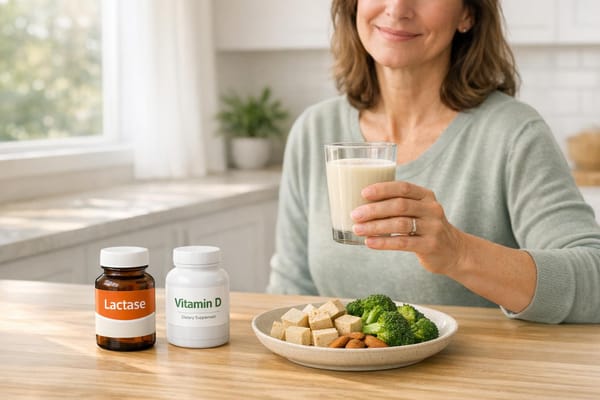5 Myths About Lactose Intolerance
Lactose intolerance myths debunked: understand the differences, manage symptoms, and enjoy dairy without discomfort.

Lactose intolerance is often misunderstood, leading many people to unnecessarily give up dairy. Here’s the truth: you don’t have to completely avoid dairy, and managing symptoms is easier than you think. Let’s bust the 5 biggest myths about lactose intolerance:
- Lactose Intolerance ≠ Dairy Allergy: They’re not the same. Lactose intolerance is about enzyme deficiency, while a dairy allergy involves the immune system.
- Not All Dairy Causes Symptoms: Many low-lactose products like aged cheese or Greek yogurt are easier to digest.
- Complete Dairy Avoidance Isn’t Necessary: Enzyme supplements can help you enjoy dairy without discomfort.
- It’s Not Just Genetic: Lactose intolerance can develop over time due to aging or health changes.
- Symptoms Vary by Person: Everyone’s tolerance level is different, and enzyme supplements can help bridge the gap.
Quick Comparison: Lactose Intolerance vs. Dairy Allergy
| Aspect | Lactose Intolerance | Dairy Allergy |
|---|---|---|
| Cause | Low lactase enzyme production | Immune reaction to dairy proteins |
| Management | Enzyme supplements, portion control | Strict avoidance of dairy |
| Severity | Uncomfortable, not life-threatening | Can be severe or life-threatening |
| Onset Time | 30 minutes to 2 hours after eating | Often immediate (within minutes) |
Why Lactose Intolerance Isn't What You Think
1. Lactose Intolerance vs. Dairy Allergy
Understanding the difference between lactose intolerance and a dairy allergy is crucial for managing these conditions effectively.
Myth: Lactose intolerance is the same as a dairy allergy. In reality, they are entirely different issues that require separate approaches.
Lactose intolerance is a digestive issue caused by insufficient production of lactase, the enzyme needed to break down lactose (a sugar found in dairy). When lactose isn’t properly digested, it can lead to discomfort like bloating or diarrhea. This condition can often be managed with enzyme supplements. For instance, products like milktab provide lactase along with protease and lipase, helping your body better digest dairy.
On the other hand, a dairy allergy is an immune system reaction to the proteins in dairy products. Even a small amount of exposure can trigger symptoms, which may range from mild to severe, and complete avoidance of dairy is necessary.
Here’s a quick comparison of the two:
| Aspect | Lactose Intolerance | Dairy Allergy |
|---|---|---|
| Root Cause | Low lactase enzyme production | Immune reaction to dairy proteins |
| Management | Can be managed with enzyme supplements | Requires strict dairy avoidance |
| Severity | Symptoms are uncomfortable but not severe | Can be severe or life-threatening |
| Onset Time | 30 minutes to 2 hours after consumption | Often immediate (within minutes) |
This breakdown highlights the importance of an accurate diagnosis. If dairy causes you discomfort, it may be due to enzyme deficiency rather than an allergic reaction. Knowing the difference ensures the right management approach.
2. All Dairy Products Cause Symptoms
Myth: If you're lactose intolerant, you have to completely avoid all dairy products. This common belief often leads to cutting out dairy unnecessarily.
The reality is that different dairy products contain varying levels of lactose, and many people with lactose intolerance can still enjoy some dairy without issues. The key is understanding your own tolerance levels and making smart choices.
Here’s a quick look at lactose levels in popular dairy products:
| Dairy Product | Lactose Content | Digestibility |
|---|---|---|
| Regular milk | High (12g per cup) | Harder to digest |
| Hard aged cheeses | Very low (<1g) | Easier to tolerate |
| Greek yogurt | Low to moderate (4g) | Often manageable |
| Butter | Minimal (trace amounts) | Usually tolerated well |
| Cream cheese | Low (1g per ounce) | Often manageable |
For higher-lactose foods, enzyme supplements like milktab (which contains a triple-enzyme blend) can help make digestion easier.
How to manage dairy if you're lactose intolerant:
- Start with small portions to gauge your tolerance.
- Choose low-lactose options like aged cheeses.
- Take enzyme supplements when eating high-lactose foods.
- Spread out your dairy consumption throughout the day.
Everyone’s tolerance is different, so it’s worth experimenting with portion sizes, low-lactose options, and supplements to find what works best for you.
Next, let’s tackle the idea that avoiding dairy entirely is the only solution.
3. Complete Dairy Avoidance is Required
Myth: If you're lactose intolerant, you have to cut out all dairy from your diet.
This belief often leads people to avoid dairy unnecessarily, missing out on important nutrients it provides. The truth is, many individuals with lactose intolerance can still enjoy dairy by managing their intake wisely. Enzyme supplements can help by providing the enzymes needed to digest lactose comfortably. Here are some practical tips to include dairy in your diet without overwhelming your digestive system:
| Strategy | How to Apply | Why It Helps |
|---|---|---|
| Use enzyme supplements | Take them before eating dairy | Aids in breaking down lactose |
| Start gradually | Begin with small servings | Helps your body adapt over time |
| Space consumption | Spread dairy intake throughout the day | Lessens the load on digestion |
| Choose wisely | Opt for low-lactose dairy products | Eases digestion and builds tolerance |
The key is finding what works for your body. With the right approach - like enzyme supplements and thoughtful eating habits - you can still enjoy dairy while keeping your digestion in check.
4. Only Genetic or Present at Birth
There's a common myth that lactose intolerance is purely genetic or only present from birth. This isn't entirely accurate.
While genetics do play a role, the ability to digest lactose depends on the production of the enzyme lactase, which often decreases as people age. Beyond genetics, other factors like aging, digestive health issues, certain medications, and gastrointestinal conditions can also reduce lactase production over time. This shows that lactose intolerance isn't necessarily a permanent or unchanging condition - it can develop or change throughout life.
Whether it’s inherited or acquired, lactose intolerance can be managed effectively. For example, using digestive enzyme supplements like milktab's triple-enzyme formula can help you enjoy dairy products without discomfort.
It's important to understand that lactose intolerance can arise at any stage of life. Developing new sensitivities doesn’t mean you have to give up dairy entirely - adjusting your diet and using enzyme supplements can help you continue to enjoy it.
5. Same Symptoms for Everyone
Many people mistakenly believe that lactose intolerance affects everyone the same way. In truth, symptoms can differ greatly from one person to another, depending on how much of certain digestive enzymes their body naturally produces.
For instance, individuals with higher levels of lactase might experience only mild discomfort after consuming dairy. On the other hand, those with lower lactase production may have more severe reactions, even with small amounts of dairy.
The key enzymes involved in digesting dairy are:
- Lactase: Breaks down lactose (milk sugar)
- Protease: Processes proteins
- Lipase: Helps digest fats
Because enzyme levels vary from person to person, supplements can be a practical way to manage symptoms. For example, milktab provides a supplement containing 27,000 FCC units of lactase, 22,000 FCC units of protease, and 1,000 FCC units of lipase, which can make digesting dairy easier for many people.
Recognizing these individual differences highlights the need for a tailored approach to managing lactose intolerance rather than relying on a universal solution. This also plays a role in how we select dairy products, as the next section will explore.
Dairy Product Lactose Levels
Lactose levels in dairy products can vary significantly depending on how they're processed and aged. This variation directly affects how easy they are to digest.
High vs. Low Lactose Foods
| Product Type | Serving Size | Lactose Content | Notes |
|---|---|---|---|
| High Lactose | |||
| Regular milk | 1 cup (8 fl oz) | 12–13 g | Contains the highest amount of lactose |
| Ice cream | ½ cup | 9–11 g | Among the higher lactose dairy options |
| Cottage cheese | ½ cup | 6–8 g | Fresh cheese with a notable lactose amount |
| Yogurt (regular) | 6 oz | 5–6 g | Live cultures may help with digestion |
| Low Lactose | |||
| Hard aged cheese (Parmesan) | 1 oz | 0.1–0.2 g | Aging reduces lactose to near negligible levels |
| Butter | 1 tbsp | 0.1 g | Mostly fat with very little lactose |
| Swiss cheese | 1 oz | 0.4 g | Lower lactose due to the aging process |
| Greek yogurt | 6 oz | 2–3 g | Strained to remove excess lactose |
Understanding these differences helps you navigate lactose intolerance while still enjoying dairy. If you choose higher-lactose options, consider using a lactase supplement to aid digestion. For instance, products like milktab offer a triple-enzyme lactase pill designed to break down lactose more effectively.
Start with low-lactose foods and gradually introduce higher-lactose items, pairing them with enzyme supplements as necessary. This approach allows you to enjoy dairy without discomfort or overly restricting your diet.
Key Points to Remember
Here are the main takeaways to help you navigate dairy choices effectively:
Managing Lactose Intolerance
- Lactose intolerance affects everyone differently. For many, total dairy elimination isn’t necessary.
- Certain dairy products, like aged cheeses and Greek yogurt, are naturally lower in lactose and may be easier to tolerate.
Using targeted enzyme support can make dairy consumption more comfortable. For example, lactase supplements like milktab provide 27,000 FCC units of lactase along with other supportive enzymes, helping you enjoy dairy without discomfort.
"Milktabs WORK!! I went on a European vacation and ate all the cheeses I wanted to! It was so great to have these tabs!!!!" - Juana
Consult a Healthcare Provider
To manage lactose intolerance effectively, work with your healthcare provider. They can assist with:
- Testing to confirm a diagnosis.
- Determining your specific tolerance levels.
- Developing a balanced diet plan.
- Recommending the right enzyme supplements.
By understanding your unique tolerance and using the right tools, you can enjoy dairy without unnecessary discomfort.
For the best results, take your lactase supplement before consuming dairy (limit to a maximum of 2 pills per day) to manage varying lactose levels.



